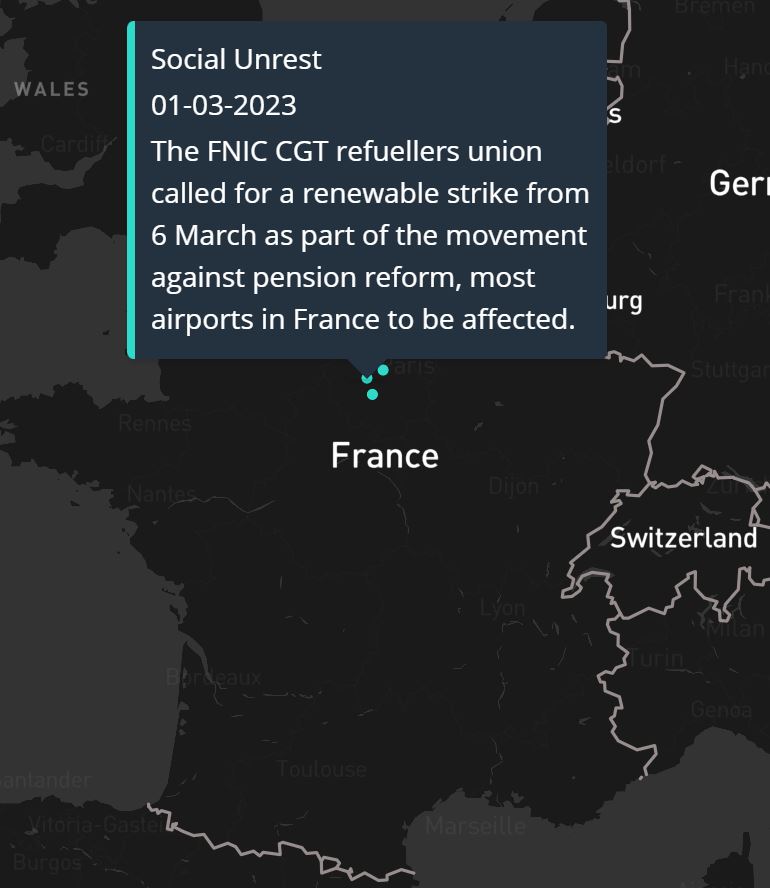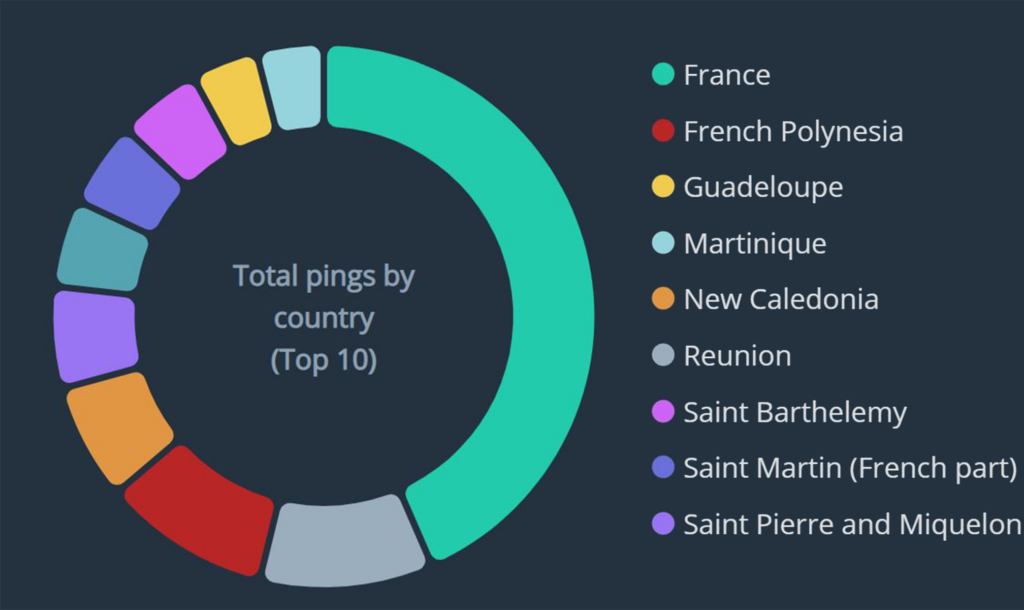Background
On 19 January, several unions, including the National Union of Autonomous Trade Unions (UNSA) for Civil Aviation, the French Democratic Confederation of Labour (CFDT) and the General Confederation of Labour (CGT), among others, called for a nationwide general strike to protest against the government's plan to delay the legal age of retirement by two years from 62 to 64. This triggered a wave of further industrial action across various sectors, including aviation, as well as related protests, roadblocks and targeted power outages. The events have repeatedly disrupted flight schedules across airports both in mainland France and in French overseas territories.
Since January, Osprey Flight Solutions has collected data and issued numerous proactive and post-incident alerts highlighting industrial action and related social unrest affecting aviation operations to support the aviation industry and assist clients in mitigating the potential impacts at airports and in their vicinity.

Industrial Strike Action
Since the beginning of the pension reform controversy, Osprey has published 12 alerts, 11 of which proactively warned of upcoming nationwide strikes, and one highlighted protests at airports as they occurred. As demonstrated by the graph above, there was a gradual escalation in social unrest, starting with two days of strikes in January. Unions then called for protesters to take to the streets three times in February and five times in March; of note, in mid March, the government resorted to article 49.3 of the Constitution to force the adoption of the reform, preventing deputies from voting on the text, triggering several violent protests in major cities.
| French nationwide industrial action | Osprey proactive alerts (publication date) |
| 19 January | 18 January |
| 31 January | 30 January |
| 7 February | 6 February |
| 11 February | 10 February |
| 16 February | 15 February |
| 7 March | 6 March |
| 11 March | 7 March |
| 15 March | 14 March |
| 23 March | 20 March |
| 28 March | 27 March |
| 6 April | 3 April |
| 13 April | 12 April |
| 1 May | Upcoming |
Air traffic control (ATC) staff and other civil aviation workers represented by unions such as the Union Syndicale de l'Aviation Civile (USAC-CGT) and CGT Air France have repeatedly confirmed their participation in the strikes. In turn, this has prompted the issuing of numerous NOTAMs advising of flight schedule reduction requirements, primarily affecting Marseille Provence (LFML/MRS), Bordeaux-Mérignac (LFBD/BOD), Paris-Orly (LFPO/ORY), Toulouse-Blagnac (LFBO/TLS) and Lyon-Saint Exupéry (LFLL/LYS). In the French overseas territories, multiple NOTAMs have been published regarding disruption to airport operations, air traffic and meteorological services.
Separately, Osprey has continued reporting on fuel supply issues related to an aircraft refueller strike since 6 March. NOTAMs have regularly been published for Paris Charles de Gaulle (LFPG/CDG), Paris-Orly, Beauvais Tillé (LFOB/BVA), Paris-Le Bourget (LFPB/LBG), Toulouse-Blagnac, Marseille Provence and Nantes Atlantique (LFRS/NTE) airports.

Protests and other action
The nationwide strikes have been accompanied by protests and, on some occasions, roadblocks, which, since February, have also more frequently occurred independently of industrial action, affecting access to/from airports. For example, on 7 March, protests and roadblocks affected access to Marseille and Nantes airports, among others. A peaceful protest was also held outside Paris Charles de Gaulle Terminal 2. On 23 March – the ninth nationwide day of industrial action – Osprey issued an alert as protesters blocked access to the facility's Terminal 1, forcing travellers to reach it on foot. On the same day, access to Nice Airport's Terminals 1 and 2 was also blocked.

Protesters have also occasionally triggered "targeted power cuts", including against airports. For example, on 16 March, members of the CGT Energie 33 section reportedly claimed to be the perpetrators of power cuts in Merignac that affected Bordeaux Merignac Airport; however, air traffic was unaffected as the facility's generators quickly took over. Earlier, on 13 March, members of the CGT in the Alpes-Maritime region were also reported to have cut power to Cannes-Mandelieu Airport (LFMD/CEQ), forcing the facility to shut down.
Strikes and related action have also impacted French overseas territories, particularly Reunion, French Polynesia and New Caledonia, as demonstrated by the chart below.

Outlook
Protests over the pension reform began on 19 January and have continued into the second quarter of 2023. Of note, the Interior Ministry recorded a record number of 1.28 million protesters on 7 March, a level unseen in previous major protests in France since 1995. Similar to what occurred following the use of the constitutional article 49.3 by the government, the next nationwide protests on 1 May – which also coincide with Labour Day – will likely be well-attended, causing major disruption, after the government signed the reform into law on 15 April. Further action is expected on 20 and 28 April, although not all unions have agreed on joint action, suggesting that participation may be lower than expected on those dates. Furthermore, the upcoming protests and strikes during April will coincide with the school spring holiday period, highlighting a possible slow-down in the social movement. Irrespective of the above, it is likely that demonstrations will continue affecting operations in France and its overseas territories throughout Q2 and Q3. Of note, on 3 May, the Constitutional Court will rule on a second draft filed by the opposition to organise a referendum on the new law. On 1 September, the new bill will come into effect. Both dates will be key to monitor as they will most likely stir more ire and bring further protests.
In addition, some protests have escalated in main urban centres, posing a risk to bystanders, potentially including air crew and passengers. Although previous protests and roadblocks at/near airports have passed off without major security incident, there is a possibility that future protests might become more radical, affecting airport operations.
ATC service disruption is a notable safety-of-flight concern, and rerouting of civil aviation using airports in and airspace over France and its overseas territories is a credible risk during periods of industrial action. As a precaution, operators are advised to conduct operational risk-based identification of divert and alternate airports for flight schedules with planned stops at aerodromes in the affected countries or with overflight of their airspace. Operators are advised to ensure flight plans are correctly filed, attain proper special approvals for flight operations to sensitive locations and obtain relevant overflight permits prior to departure.
Osprey will continue monitoring levels of social unrest in France and its overseas territories, issue updates on upcoming strike action and other related activities, and provide up-to-date, detailed information and advice through our Updates and Osprey:Explore.








